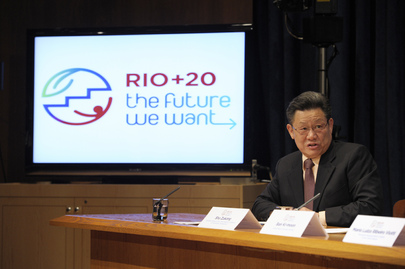Fiona Nunan is a Lecturer in Environment and Development in IDD, specialising in environment and natural resource management and governance, including fisheries governance and management, poverty and the environment, and impact evaluation methods and approaches. She convenes the module on Transforming Development for Sustainability and co-convenes Critical Approaches to Development and Making Policy on campus and via distance learning.
Drafting outcome documents from international conferences must be no easy task! Just how can you summarise the complex negotiations that have taken place, the diversity of views and interpretations of terms, and the range of commitments, or lack of them? There are just five months to go until the United Nations Conference on Sustainable Development takes place in Rio de Janeiro, Brazil, marking twenty years after the 1992 Earth Summit, also held in Rio. A couple of days ago, the ‘zero draft’ of the outcome document, “The Future We Want”, was released.
Jean-Bertrand Aristide, President of Haiti (at podium), addresses the United Nations Conference on Environment and Development (UNCED), or Earth Summit, 12 June 1992. Photo credit: UN Photo 281533.
The 1992 Earth Summit produced an array of impressive conventions and commitments, including the Rio Declaration, Agenda 21 and the Framework Convention on Climate Change. However, in reading the Zero Draft of the outcome document for the 2012 conference, you get a strong feeling of frustration that progress since 1992 has been slow and piecemeal and that what is really needed is action based on the 1992 agreements rather than yet more new concepts, ideas and targets. Swiftly following the preamble, the second section is entitled “Renewing Political Commitment”, recognising that this is what has been lacking, but are there really any indications that there will be a major change any time soon?
The flyer for the Conference suggests that Rio+20 provides a chance to “move away from business as usual”. Whilst the flyer sets out some innovative approaches that have been taken in moving towards more sustainable development, the draft outcome document doesn’t embrace the same spirit of opportunity. It gives little sense of the urgency or the scale of change required to respond effectively to the major environmental and social challenges faced.
Two key themes have been set for the Conference:
- a green economy in the context of sustainable development and poverty eradication
- the institutional framework for sustainable development
Sha Zuzkang, Under-Secretary-General for Economic and Social Affairs, speaks at the launch of “Rio+20: The Future We Want”, a campaign enabling people around the world to contribute to discussions on sustainability, the world we want in 20 years and how that vision is achieved. Photo credit: UN Photo 495393.
The ‘green economy’ agenda is solution-oriented, looking for green business and employment opportunities, but, is there a danger that the Conference could be taken over, or perhaps has been already, by concerns about global recession and the need for economic growth, without sufficient attention to the state of our planet’s resources and equity in access to those resources. What happened to increasing interest in ideas such as “Prosperity without Growth”, wellbeing and quality of life? Where is the intrinsic value of nature recognised in the Zero Draft Outcome document?
Of course, you wouldn’t expect the outcome document to present detailed solutions, but what would be good to see is greater recognition of the scale of environmental challenges we face, with the existence of nature recognised as being beyond a resource for our insatiable consumption, and stronger commitment to change. Instead of a list of things that must not be done in assisting developing countries build a green economy, positive language is needed, emphasising the opportunities that exist to adopt technologies and approaches that support greater equality and sufficiency, whilst reducing our terrifyingly large impact on the global environment.
Yes, now is the time for much greater political commitment to sustainable development, but let’s hope we’re not looking back in another 20 years, wondering how that time passed, with so little progress to show for it.


